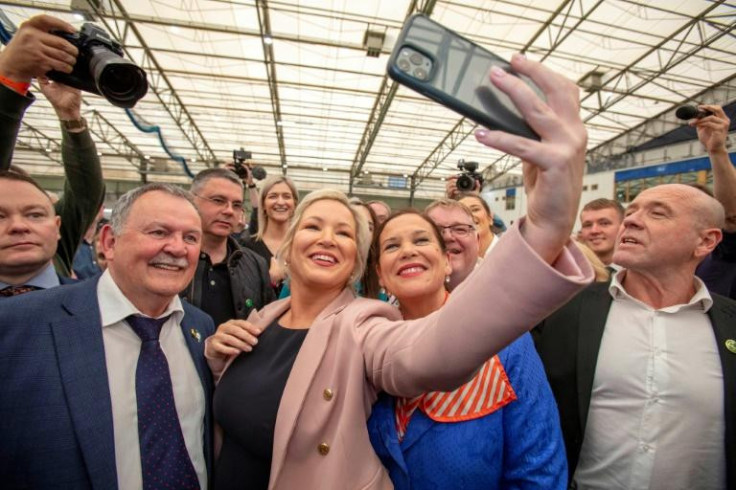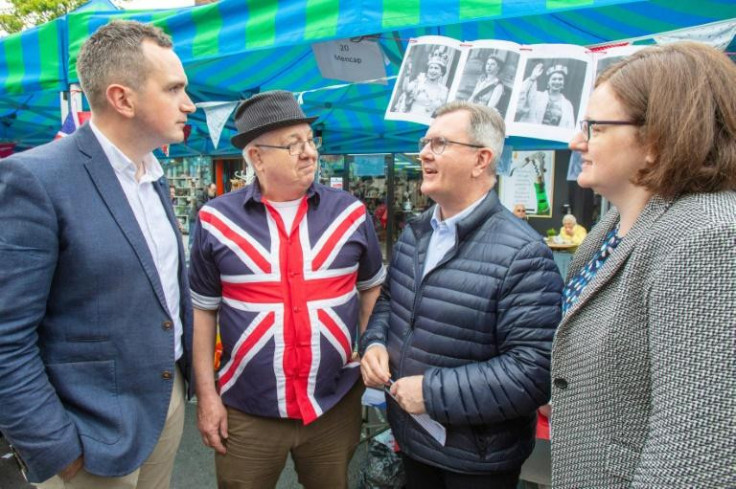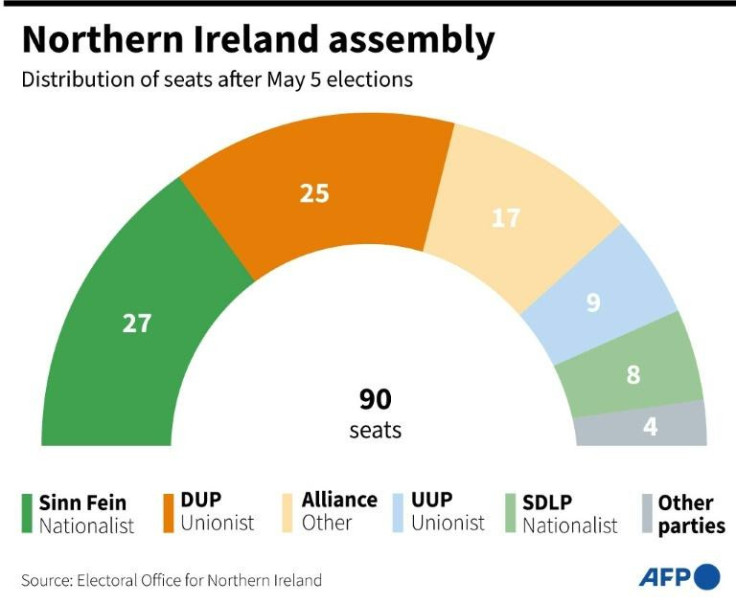Northern Ireland in limbo after Sinn Fein triumphs
The Irish and US governments also urged Northern Ireland's leaders to form a new power-sharing executive, under the terms of a 1998 peace deal that ended three decades of bloodshed.
Northern Ireland's feuding leaders came under international pressure Sunday to unite in a new government, after the Irish nationalist party Sinn Fein secured an unprecedented election win.
Once the political wing of the paramilitary IRA, Sinn Fein won enough seats in the devolved legislature to nominate its Northern Ireland leader Michelle O'Neill as first minister.
The result from Thursday's election for the Stormont assembly marked a potentially seismic shift, a century after Northern Ireland was carved out as a Protestant fiefdom under British rule.
With all 90 seats filled from Thursday's proportional voting, Sinn Fein won 27 seats, ahead of the Democratic Unionist Party (DUP) on 25 and the cross-community Alliance party on 17.
At the imposing Stormont legislative building, formerly a bastion of unionist monopoly power, disaffected DUP voter Jordan Black said: "I feel like a lot of them are stuck in the past really.

"Change might be for the better," the 26-year-old mechanic told AFP.
"If they (Sinn Fein) start doing stuff that helps people and helps everybody, then more power to them, 100 percent," he said.
O'Neill said the result "ushers in a new era" for the divided territory, and Sinn Fein said it wanted a referendum on reuniting Ireland within five years.

But only the UK government can grant a referendum, and Northern Ireland Secretary Brandon Lewis noted that a majority of voters overall still backed the constitutional status quo.
Ahead of convening party leaders for talks in Belfast on Monday, Lewis recognised nevertheless that Sinn Fein's triumph was a "significant moment for Northern Ireland".
"I think it is an important moment to show that everybody can work together, regardless of who is first and deputy first minister," he told BBC television.
Lewis urged the leaders to "work with each other to find a way to come back into Stormont (and) form the executive".
The Irish and US governments also urged Northern Ireland's leaders to form a new power-sharing executive, under the terms of a 1998 peace deal that ended three decades of bloodshed.

But DUP leader Jeffrey Donaldson demanded Prime Minister Boris Johnson first "deliver on his word" and scrap post-Brexit trading rules with the EU.
Unionists fear the so-called Northern Ireland Protocol is casting them adrift from the UK, by imposing a de-facto trading border in the Irish Sea.
Lewis said the government still preferred to negotiate a solution with Brussels on the protocol -- but reserved the right to act unilaterally to protect intra-UK trade and Northern Ireland's constitutional status.
"It's very disappointing that what we're hearing is the EU is already saying it won't show any flexibility," the minister said.
While Sinn Fein will get to nominate a first minister, Northern Ireland's government can only form under the 1998 deal if the DUP agrees to take part and serve in the role of deputy first minister.
Lorraine Kane, a 58-year-old civil servant, said "the DUP shot themselves in the foot, pretty much".
"They talked a lot about the Northern Ireland Protocol and the Irish Sea border, and that's not what people wanted out of this election.
"People were more concerned about the cost of living. I think that's where Sinn Fein hit it right on the nail," she said.
"It'll be interesting to see now if the DUP will actually go into the power-sharing agreement with them, or whether they'll simply be like naughty boys and throw their toys out of the pram and decide that they don't want to play anymore."
The parties have 24 weeks to resolve their differences or face a new election. Ministers from the outgoing executive can continue in caretaker roles, overseen by London.
Katy Hayward, professor of political sociology at Queen's University Belfast, said the parties were likely to take the full 24 weeks for interminable horse-trading.
She noted the DUP wants the protocol removed, Sinn Fein has longstanding demands to protect the Irish language and the Alliance wants an overhaul at Stormont to recognise the rise of the middle ground -- none of which can be easily achieved.
"But given the urgency of crises in the cost of living and healthcare, we do need an executive formed and then can think of bigger adjustments to the (1998) Good Friday Agreement when we're in a better place," Hayward told AFP.
© Copyright AFP 2022. All rights reserved.
© Copyright AFP 2025. All rights reserved.




















